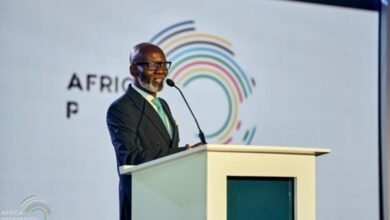Mobile : a driver of growth and inclusion
In 2025, Africa’s mobile economy is worth $220 billion, representing 7.7% of the continent’s GDP. These figures are more than statistics: they tell the story of a continent where the mobile phone has become much more than a communication tool. Today, it is a driver of development and a passport to digital and social inclusion.

According to the GSMA’s The Mobile Economy Africa 2025 report, the mobile sector contributed $220 billion to Africa’s economy in 2024, representing 7.7% of the continent’s GDP. This contribution is expected to reach $270 billion by 2030, supported by the expansion of mobile services, business digitization, and wider adoption of digital technologies, including 5G.

This growth is fueled by the continuous increase in unique subscribers, expected to rise from 710 million in 2024 to 915 million in 2030, representing 47% and 53% of Africa’s population, respectively. At the same time, the number of mobile internet users is expected to increase from 416 million to 576 million, a rise from 28% to 33% of the population.
Behind these numbers lies a connected Africa, where access to 4G, 5G, and artificial intelligence is tangibly changing citizens’ lives.
Mobile is no longer a luxury, it is a tool for social and economic transformation
In Rwanda, programs such as Airtel’s ConnectRwanda 2.0 provide affordable smartphones to populations who, just a few years ago, could never have imagined connecting to the world. « Mobile is no longer a luxury, » reiterates the Airtel representative, « it is a tool for social and economic transformation. »
This transformation is not limited to major cities. In Kenya, M-KOPA enables thousands of off-grid households to access solar energy and the Internet through mobile payments adapted to their incomes. In Zambia, Liquid Intelligent Technologies supports small businesses in their digital transition, giving often isolated entrepreneurs the means to sell, buy, and grow like never before. These initiatives show that African innovation is not just technological: it is social and inclusive.
For traditional operators, inclusion has also become a priority. MTN in South Africa distributes discounted smartphones to allow low-income households to access 4G. Airtel, in partnership with SpaceX, is expanding satellite Internet in rural areas, finally providing high-speed access to schools, hospitals, and businesses far from urban centers.
Young African startups also play a key role in digital inclusion. Wave in West Africa allows free, instant mobile money transfers, facilitating access to financial services for the unbanked. In Nigeria, Paylater (Carbon) provides fast mobile-based credit to those without access to traditional banks. In East Africa, SafeBoda combines a mobile app with urban mobility to create jobs for drivers while offering safe transportation for city residents. These initiatives demonstrate that mobile is not just a technical tool: it transforms daily life, stimulates entrepreneurship, and reduces inequalities.
Artificial Intelligence: A Catalyst for Growth
Artificial intelligence (AI) is emerging as a key driver of digital transformation in Africa. The African Union’s continental AI strategy emphasizes its potential to boost economic growth, social inclusion, and governance innovation. Several African countries have already developed or launched national AI strategies, while others are in advanced consultation phases, reflecting growing momentum for AI development across the continent.
The modernization of mobile networks in Africa, with the expansion of 4G and 5G networks, plays a crucial role in widening access to AI solutions for users across the continent. These infrastructures provide faster and more reliable connectivity, facilitating the adoption of advanced technologies such as AI in sectors including agriculture, health, education, and financial services.
Business Digitization: A Lever for Competitiveness
Mobile operators play a dual role in business digitization in Africa: not only as connectivity providers but also as facilitators of digital services, supporting sector-specific solutions in finance, retail, agriculture, logistics, health, and manufacturing. Services such as mobile money, open APIs, cloud computing, and AI tools help businesses overcome operational challenges, including payment facilitation, fraud reduction, and efficiency improvements. This strengthens the importance of these sectors within society while enhancing the competitiveness of African businesses in global markets.
Virtual Mobile Operators: Addressing Specific Needs

Virtual Mobile Network Operators (MVNOs) have seen renewed interest in Africa in recent years, with notable developments in licensing in several countries. Currently, there are more than 60 MVNOs across 11 African countries. MVNO business models often target niche market segments in mature mobile markets, relying on strong partnerships with network operators. Practically, this means reaching underserved demographics with personalized offerings that complement rather than cannibalize operator services. Successful deployment requires strategic alignment with operators, clear regulatory frameworks, and commercial viability.
Digital Inclusion: A Challenge to Overcome
Despite progress, challenges remain in digital inclusion in Africa. In 2023, 58% of unconnected Africans already lived in areas covered by mobile broadband, suggesting that the main barrier is not infrastructure but usage gaps. Factors such as affordability, high device and service costs, sector-specific taxes, and low digital literacy contribute to this gap. Policymakers and stakeholders must intensify efforts to address these challenges and connect more people.
To address this, the World Bank launched the IDEA program (Digital Inclusion for East and Southern Africa), aiming to accelerate digital inclusion for 180 million people by 2032. The program focuses on expanding Internet access and inclusive use of digital services, emphasizing infrastructure, digital literacy, and financial accessibility.
The obstacle is not always technical: device costs, low digital literacy, and taxes weigh on inclusion
Yet, despite these advances, Africa still faces hurdles. Nearly 60% of unconnected Africans live in areas already served by mobile networks. Thus, the obstacle is not always technical: device costs, low digital literacy, and taxes impede inclusion. Through the IDEA program, the World Bank aims to connect 180 million people in East and Southern Africa by 2032, focusing on affordable access, digital education, and financial services.
The future of Africa’s mobile economy looks promising, with continued investment in infrastructure, growing adoption of digital technologies, and increased attention to digital inclusion. However, to fully realize this economy’s potential, it is essential to overcome existing challenges, including infrastructure, regulation, and digital education. Partnerships between public and private sectors, along with continental initiatives such as the AfCFTA, will play a crucial role in creating an environment conducive to growth and digital inclusion.
Mobile in Africa is not just a story of numbers or technology: it is a tangible lever to bring citizens closer to knowledge, services, and economic opportunities.
Consult the report The Mobile Economy Africa 2025






